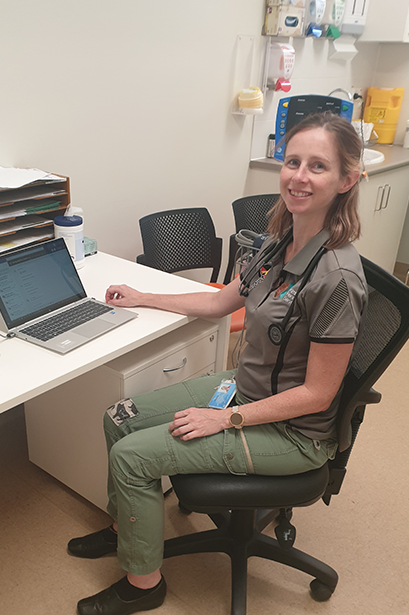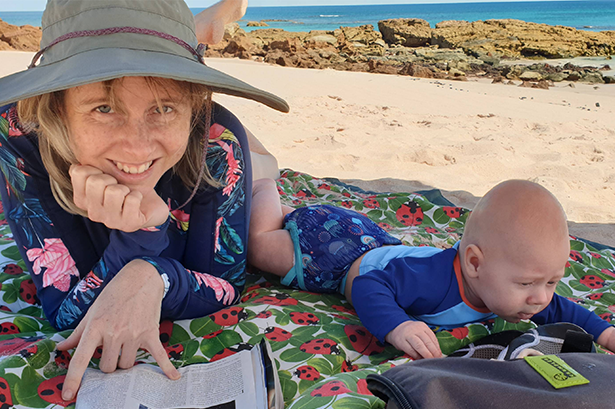• GP-renal specialist
• Kimberley Aboriginal Medical Service supervisor
• Public health physician
• RCSWA Alumni – Karratha 2006
As both a clinician and academic, Dr Emma Griffiths is finding balance between the small and big pictures.
An alumna of the Rural Clinical School of WA (RCSWA), Karratha 2006 class, Emma is today supervising student researchers at RCSWA Broome and public health registrars at the Kimberley Aboriginal Medical Service (KAMS), all while treating dialysis patients as a GP-renal specialist.
She and her colleagues at KAMS also provide post-surgical support to renal transplant patients and those with end-stage renal impairment.
Closing the equity gap for remote renal patients is something Emma is passionate about, and she hopes a current RCSWA and KAMS partnership research project will “benefit the bigger picture” and improve outcomes for patients.

Image: Dr Emma Griffiths, GP renal specialist working in clinic.
The project aims to increase indigenous participation in renal transplantation, ensuring that all dialysis patients can access a formal assessment on their transplant suitability.
“Our goals are for all patients to have access to assessment for transplant suitability, to know what their transplant status is, and to be supported with things they can do to increase their chances of getting a transplant,” she explained.
“That (assessment) was missing for some patients who had been on dialysis for years without knowing whether they could access transplantation”
A kidney transplant improves a patient’s quality of life over being on dialysis and has the potential to increase life expectancy.
Emma said many patients had to move away from their remote communities for dialysis, but a transplant gave them the ability to be back home on country with family.
“There is definitely an equity gap there (between remote and city patients) and that was highlighted not just locally but significantly in the media two years ago which culminated in the formation of the National Indigenous Kidney Transplant Taskforce,” she said.
“Some of the factors were (patient) remoteness from tertiary centres and complicated service arrangements which led to a particularly low rate of transplantation in the region.”
Patients have experienced some service improvements and increased transplant access over the past two years, according to Emma, and researchers will continue to monitor and make recommendations for a sustainable long-term approach.
Emma said she enjoyed teaching renal medicine and research techniques, using a combination of lecture-based teaching, interactive group workshops and one-on-one mentoring.
“I support the students to develop their research skills, with some not necessarily having had that exposure, and to achieve a final product at the end of two years. I do enjoy that, where the research and teaching come together,” she said.
For those junior doctors choosing to research, I hope they have a positive experience, and if they’re not going into research, then understanding the research and knowing how to access and read it. Evidence-based practice is really important.
Dr Emma Griffiths
This academic is certainly multi-skilled, having just completed a PhD part-time over six years and writing her thesis while on maternity leave. She also holds a Masters of Public Health and Tropical Medicine.
Emma’s thesis explores reproductive health services in remote areas, contraception and pre-conception care, reproductive autonomy, reproductive health consultations, and touches on pre-conception care in the context of intergenerational health.
If she had more time on her hands, Emma said she would like to focus on disease prevention through public health education.
“I feel strongly about preventative health and primary health care being important parts of the system.
“To me, primary health is all aspects of health connected. That is the big picture and that is what is important.
“If you think of how reproductive health and renal health comes together… if women are getting culturally appropriate pre-conception care, if they are entering their pregnancies with well-managed chronic diseases, are having safe and healthy pregnancies, then babies born from those pregnancies will have a lower risk for renal disease in the future,” she explained.
Emma encourages students to become GP-renal specialists, a career model almost entirely unique to the Kimberley and an unusual opportunity to practice shared care between GPs and specialist medicine.
Witnessing her students return as junior doctors to the Kimberley and other regional areas around Australia gives her hope for the future of the rural health workforce and that “bigger picture”.

Image: Dr Emma Griffiths finding balance on the beach with her son.
Dr Emma Griffiths PhD research project: Reproductive health in the Western Desert, 2021.
